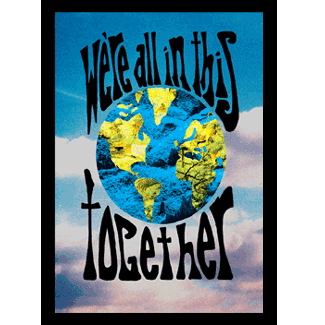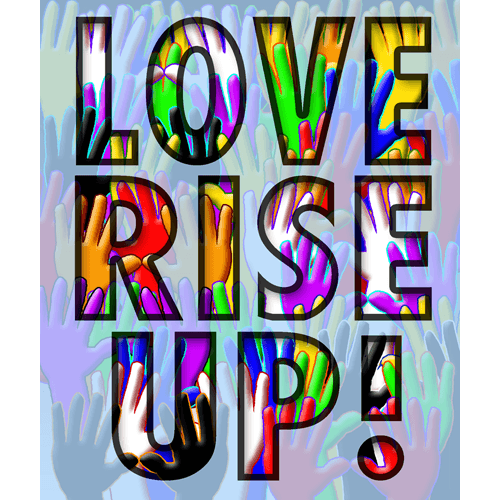The Challenge Of Violence
The news in the past few months has been particularly amplified with stories of brutality, eliciting public outrage and vows to seek vengeance. Two Japanese captives were beheaded following an attempt to extort millions of dollars, in another public display of cruelty a captured Jordanian pilot was burned alive in a cage. Most recently, American humanitarian Kayla Mueller’s death has lead the news, leaving people around the world stupefied and helpless to see the extreme behavior of a group whose aim seems to be the destruction of anyone who is not one of them. 
Beyond the violence which comes from a specific ideology and source, in this case ISIS, countless other victims are filling the news from conflicts big and small. Violence and the fear and hatred that fuels it is part of the human story, but never before has it had a world audience like we have today. I live in Vietnam and watch the news broadcast from Japan, the BBC or from American worldwide channels. Everyone I know hears the stories and feels the grimace of these painful truths.
The news is designed to keep us informed about the events of the world. A citizenry needs to know what is going on in order to make informed decisions, in order to elect leaders who can solve the problems we all face. What also gets included in the news are the ideas being debated and discussed as to how to address groups like ISIS, or issues like gun violence, or bad police behavior. I feel like something is missing in the discussion, a perspective that is known and honored by many, but which rarely gets to be considered by the public viewers who may want to find answers to these problems.
Power, anger, fear…righteous indignation
My essay here will offer a view that is in line with the previous essays I have written using the concepts of understanding human will, emotion regulation, the importance of ideals and what it means to see life through a spiritual lens. It is a broad view, but can inform the decisions we make, even in the midst of the crisis we are in. What makes it a crisis is the self-perpetuating system that develops as a sequence of reactions from the outrage and sense of injustice that people experience. Both the Jordanian president and the Japanese prime minister vowed revenge, which included strong language and the images of similar kinds of suffering to what they witnessed (crucifixion and dismemberment).
The Jordanian military responded swiftly. “The blood of our hero martyr, Moaz Kasasbeh, will not go for nothing,” said Mamdouh al-Ameri, a spokesman for the Jordanian military. “And the revenge will be equal to what happened to Jordan.” (The New York Times)
Response vs. Reaction
A reaction is different than a response. We can all see and understand the emotional intensity that is generated by these horrible acts; anger, frustration, helplessness, fear, and revulsion. We are collectively horrified at the inhumanity of them. The intensity of those feelings can be the motivation for revenge. We react in order to change the way we feel. We apply our will as a way of restoring order to the chaos we feel with intense emotions. Revenge is using anger to gain power as a way of reducing fear. It becomes a way of justifying our own horrendous acts of violence under the pretext of being on the side of rightness. This is the recipe for war or for a feud. Both sides react to the actions of the other…emotionally charged, righteously indignant and without considering the role of love and the wisdom we have been taught.
A response is different than a reaction. The higher the pitch of the crisis, the stronger the emotions, the more desperate the need for control…the more difficult it is to respond from a spiritual perspective. This is where the Machiavellian ideas are seen to be the solution of the moment. Machiavelli wrote The Prince in 17th century Italy. It is still widely read today by political leaders who want to attain and maintain power. It teaches a lesson that is without love. Power is the ultimate goal and methods cannot and do not adhere to any moral code that interferes with the attainment and maintenance of that power. Within this philosophy is the idea of crushing your enemy, is the idea that the end justifies the means. While it might be quite pragmatic for those who are fearful and for whom the use of the will (power) is the solution, it creates a system of thinking that precludes many of the ideals of humanity. Learning to respond to situations as horrendous as we are seeing on TV almost every day, is learning how not to participate in those behaviors which exclude love.
Responses start with the questions, “Who am I? What are my values? What is it I will not compromise? How can I maintain my integrity?” Of course, none of us are perfect and maybe this is why we have been taught to see, “the mote in our own eye” first and to not be willing to, “cast the first stone.” A response also includes an ability to see the other, maybe the enemy, in ways that humanize them as well. We might ask, “What are they afraid of? What makes them want to take power? How am I, unknowingly, posing a threat to them? What is the intensity of their emotions? What are the positive ideals I can see in them?” Like a bully in the school yard, or child with a tantrum when we step back to see that they are acting out of intense emotions and a need for power, we can know better how to affect their behavior by responding to their needs.
Choosing Love: The Spirit Of Response
Yes…it is a little more complex than dividing the world in to ideas of good and evil, but it is in line with the degree of heaven that already exists in the world. It always takes a pause, the need to calm down and to find the wisdom within ourselves. We know what love is. We know what peace and happiness and joy and inclusion means to everyone who lives the life of humanity.
 We can evolve toward our highest form…but unlike Machiavelli who promotes fear as a way of maintaining power…we need to promote love and all its vulnerability without fear, without a false hope that through power we can control the uncontrollable. Uncertainty is our partner in the journey of life…and love can be the way to see our way through every crisis that may occur. We need to choose it.
We can evolve toward our highest form…but unlike Machiavelli who promotes fear as a way of maintaining power…we need to promote love and all its vulnerability without fear, without a false hope that through power we can control the uncontrollable. Uncertainty is our partner in the journey of life…and love can be the way to see our way through every crisis that may occur. We need to choose it.
My next essay will expand on these ideas and apply them to choices that are being made in the world we are in. I will focus on what Western and Eastern oriented cultures can learn from one another and how the world we are in helps us to realize our place in the conscious evolution we are participating in.




Thanks, Doug, for expanding on a revengeful reaction compared to the powerful response of love.